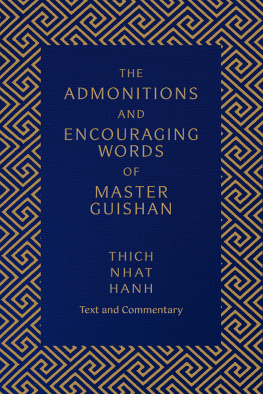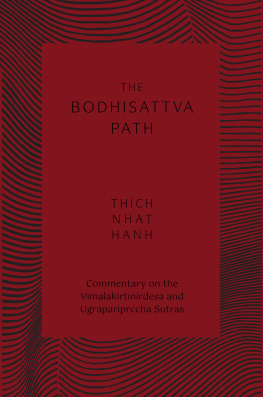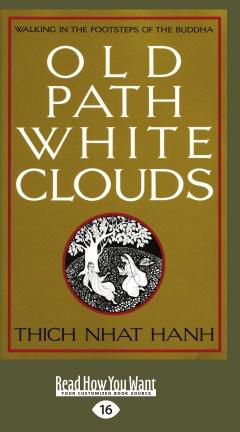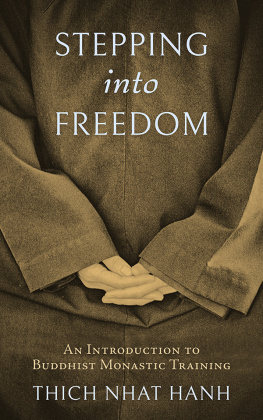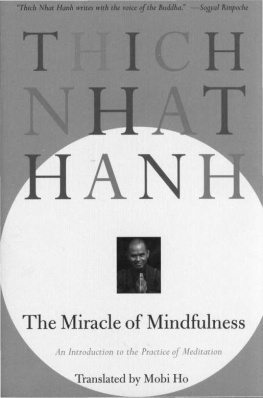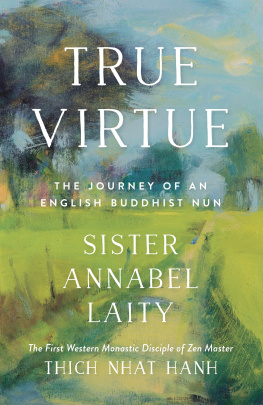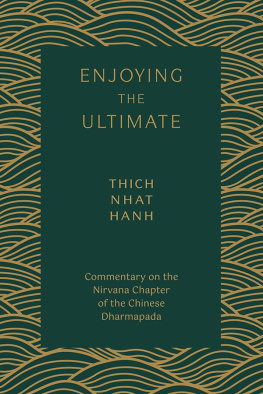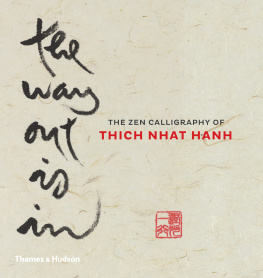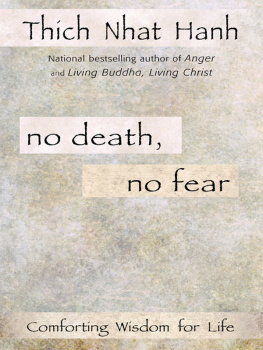
Published by Palm Leaves Press
an imprint of Parallax Press
Parallax Press
2236B Sixth Street
Berkeley, California 94710
parallax.org
Parallax Press is the publishing division of
Plum Village Community of Engaged Buddhism, Inc.
Copyright 2022 by Plum Village Community of Engaged Buddhism
All rights reserved
Printed in the United States of America
Cover and text design by Katie Eberle
Composition by Maureen Forys
Edited by members of the Plum Village editorial team: Sr. Chan Duc, Sr. Sinh Nghiem, Sr. Si Nghiem, Br. Phap Luu, Sr. Dao Nghiem.
Non-English words are in Sanskrit unless otherwise indicated or made
clear by the context.
ISBN: 978-1-952692-18-5
E-book ISBN: 978-1-952692-19-2
Library of Congress Cataloging-in-Publication Data is available upon request.
Preface by Sr. Chn c
In the spring of 1999 in Plum Village, France, Thy (the Venerable Thch Nht Hnh) commented on the Encouragements and Admonitions for an audience of monks, nuns, and laypeople. We are happy to bring these teachings to a wider audience because we feel they are very relevant in our own time. Although Master Guishan gave them 1,200 years ago, human nature, with its yearning for a spiritual practice and its reluctance sometimes to apply it, has not changed.
We still find it difficult to face and accept the obvious truth of impermanence. Accepting impermanence does not mean doing nothing or falling prey to despair. Accepting the truth of impermanence, we have the impetus to do something beneficial for the world, to live deeply the life we have been given. For example, if we can see deeply how fragile life on our planet is, we shall do all we can to help life continue. We shall not burn out when we see we have not succeeded, because we know that we have done our best and that although life may end for a time, it can always come back when the causes and conditions are right. In Thys commentary we see that we can feel loss but at the same time we need to train ourselves to go beyond appearances. We quote:
We knew that she could die at any time, so we sent her our spiritual energy, ready to accept the loss of this person. Yet, when we heard the news that she had died, we were still shocked. We had grown used to her form, to her voice, to the look in her eyes. We had grown used to experiencing her in the historical dimension. If now we want to experience her in the ultimate dimension, we will have to train ourselves to do it.
Another relevant teaching is When you have things in excess of your real need, those things cease to be valuable. Consuming in excess of our real need, in other words, greed, is one of the factors that is leading to the degradation of life on our planet. Our desire always to consume more, our feeling that money and possessions are necessary for our security, lead us to exploit life on earth to the extent that it cannot continue. Shopping for unnecessary objects of consumption has become a pleasurable pastime in our society, a way of covering up our inner emptiness. There is a great happiness in living simply with just enough for our health and welfare. There is a joy in realizing that we can do without some of the things that we used to feel an urge to possess.
A recurring theme in the teachings of Master Guishan is that of diligence in our spiritual practice. We all have a tendency to be lazy. We feel comfortable in our old habit energies. This work of Master Guishan is a goad and a spur for us to use our precious lifetime to transform these habit energies which hold us back in our suffering.
The importance of the Admonitions in the history of Buddhist meditation practice cannot be underestimated. Already in the times of early Buddhism in China, it was considered to be one of three key texts for the meditation practitioner. Master Guishan was addressing monks, but that does not mean that the work is not suitable for nuns and laymen and laywomen. In our own time we can all benefit from this strong call to wake up and change our way of life.
The commentary of Thy is very important because it helps us to understand the classical Chinese of the eighth century. The commentary comes from Thys living experience of guiding monastic and lay students on their path of practice.
This book is published as a Palm Leaves book because it is scholarly commentary, but it is also very practical and has many suggestions for our daily practice of mindfulness and meditation.
Bhikshuni Chn c
Plum Village, France
Introduction
During the Tang dynasty in the eighth century, there was an outstanding meditation master who became known as Guishan, after the mountain in Hunan province where he lived and taught. His lineage name was Lingyou, and he was born in 771 in Changxi, Fujian province, and passed away in the year 853.
Though the language of the Admonitions is 1,200 years old, it continues today to be a part of the study program of monks and nuns in China, Vietnam, and Korea. Even if you are not a monk or a nun, you can still benefit greatly from the teachings given in this work.
When I was still a novice, the Admonitions was chanted once every two weeks during the precepts recitation, so all the novices soon learned it by heart. We always chanted the text in Chinese because there was no Vietnamese translation. Now, here, we have an English translation that is very easy to understand.
This Vietnamese-to-English translation was made by Sr. Chn c from the Chinese-to-Vietnamese translation of Meditation Master Thch Nht Hnh. Eds.
The word admonition (, jng) in the title means to wake someone up. In our daily life we live as if we were in a dream. We allwithout exceptionneed a bell of mindfulness, a shout, or someones hand to wake us up and stop us from sinking into a world of forgetfulness, allowing our life to drift by in a wasteful and meaningless way. We need to be stirred out of our dream as soon as possible.
The word (c) means to urge or stimulate. Originally this word meant the rod or the whip that gives the horse energy to move forward. Stimulation in this context is not meant to beat us and make us suffer. It wakes us up so that we can advance with vigor. The word c is also used in Eastern medicine to describe the action of a tonic medicine that stimulates the bodys organs to function better or of acupuncture that stimulates the bodys acupoints so the energy can flow, and the body and mind can function better.
For more than a thousand years, all novice monks and nuns have depended on this work of Master Guishan for their training. You only have to hear the first few words and already your heart is deeply stirred: you see clearly that you need to wake up, that you need to practice more diligently to realize the aspiration that led you to monastic life. Many of us live in a state of instability, lost in a dream, drifting along like duckweed on a stream and wasting our life in forgetfulness. We really need a bell to wake us up, a rod to give us the energy to make progress.
This work is highly esteemed to the extent that ancestral teachers have made it the third principal text in a group of basic sutras for the instruction of monks and nuns. The other two texts are the Sutra in Forty-Two Chapters (, S Sh r Zhng Jng) and the Sutra of the Bequeathed Teaching (, Y Jio Jng). The whole collection is called the F Z Sn Jng (), The Three Important Scriptures of the Buddha and the Patriarchs.
Full Text of Master Guishan in English
Next page
